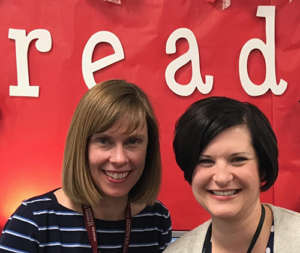Reading Recovery Works: Spread the Word
by Rhonda Precourt and Gen Arcovio
We seem to be going through a time where heavy phonics instruction and skill and drill teaching practices are taking over. The importance of making all interactions with books meaningful and enjoyable and using research-proven interventions appears to be going by the wayside. We need to make the power of Reading Recovery and its complex theory of reading more visible than ever. We need to share loud and proud about our completely individualized lessons that meet the needs of each child we work with. We need to know our reading theory well and be ready to answer questions about Reading Recovery in a clear and concise way. We must be sure that we can explain the reasoning behind anything that we do during a Reading Recovery lesson. We have experienced the downsizing of Reading Recovery teachers in our own school district and we have noticed the number of Reading Recovery teachers decrease in school districts around us. With the threat of not being a Reading Recovery teacher, we often hear from others, “Don’t worry, you’ll never lose it.”
While we know that we will always be Reading Recovery teachers at heart we feel that there are definitely some things that we will lose if we are no longer practicing Reading Recovery teachers. We would no longer attend continuing contact sessions, which we consider to be the best on-going professional development that we have ever been fortunate enough to experience. We would no longer be able to participate in behind the glass sessions which have always helped us to think deeper about the students we work with. We would longer have regular contact with our teacher leader who always keeps us grounded in our theory. The thought of missing out on these experiences has made us reflect on the importance of doing our part in sharing the power of Reading Recovery as well as sharing our knowledge about how children learn to read.
Share with parents
Call parents when you first know that you will be working with their child. Explain to them what Reading Recovery is, ask if they have any questions, and invite them in for a lesson. Update parents frequently on their child’s progress.
Here are a few ways that we stay in touch with parents:
• write a quick note on sticky notes attached to a book that the child is taking home. “Johnny sounds so smooth when reading this story.”
• write a note on the reading log. “Sara is working on pointing to each word as she reads.”
• write a note thanking parents for their support with having their child read each night.
• send home a copy of the child’s writing with a quick note about what the child can do all on their own. ” Johnny wrote the, to, go quickly all by himself!”
• Call at the end of the program to share their child’s progress and answer any questions that the parents may have.
Share with Administration & Board of Education
Invite administrators into your classroom to see lessons in action. Also, invite administrators to behind the glass sessions to see the way we observe, analyze and talk about next steps. Having administrators observe lessons and attend behind the glass sessions also helps to broaden their knowledge about how children learn to read. Share the progress your students are making with your building principal on a regular basis.
Meet with classroom teachers frequently
Work closely with your students’ classroom teachers. Listen carefully to what they are noticing about their student’s strategic activities in reading and writing. Discuss the child’s progress but make sure to provide the classroom teacher time to communicate any support that they might need. Think about how you can help support the transfer of knowledge between what happens in your room and the child’s classroom. Invite classroom teachers in for lessons and behind the glass sessions to observe how you interact with the student and the language you use to teach and prompt.
Participate in professional learning communities & Problem-solving teams
Regularly take part in school meetings and collaborate with your colleagues. Share relevant research and the theory behind reading as a complex process. Advocate for time spent together learning and not just talking data.
Professional development
Be a literacy leader by helping to provide job-embedded professional development. Pick literacy topics that are relevant to your classroom teachers’ everyday work life and stick with those topics for a period of time. In the recently released Spring 2018 edition of The Journal of Reading Recovery, RRCNA Executive Director Jady Johnson provides some guidance with explaining Reading Recovery to an “influential school decision maker in just one minute” in her article titled, It Only Takes a Minute. There are many resources available to members on the RRCNA website that can be used when communicating with families and administrators about Reading Recovery. We would also recommend reading Billie J. Askew’s article: What’s So Important About Theory? We have to stay on top of our game to keep Reading Recovery alive.
 Rhonda Precourt and Gen Arcovio are Reading RecoveryTeachers/Literacy Specialists in the Newark Central School District, Newark, New York. Follow them on their blog literacypages.wordpress.com and on Twitter @LiteracyPages.
Rhonda Precourt and Gen Arcovio are Reading RecoveryTeachers/Literacy Specialists in the Newark Central School District, Newark, New York. Follow them on their blog literacypages.wordpress.com and on Twitter @LiteracyPages.
Any views or claims expressed in The Reading Recovery Connections Blog are those of individual authors, not RRCNA.







